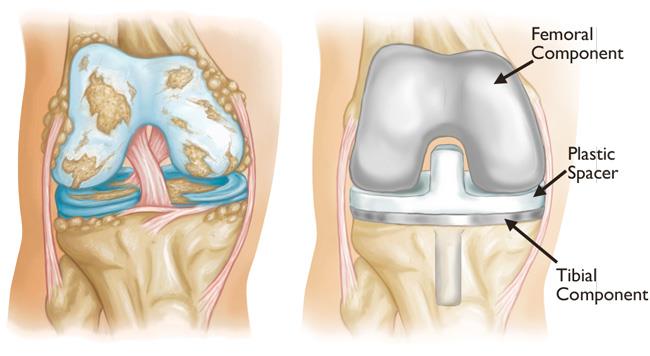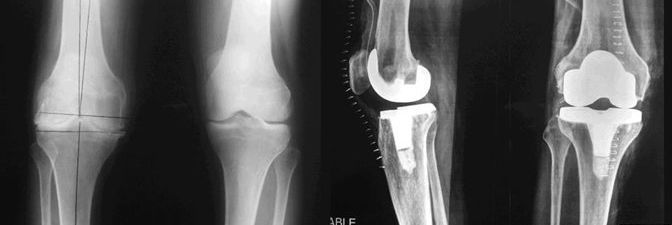Knee
Total Knee Replacement
Total Knee Replacement (TKR) is a common and effective solution for individuals suffering from advanced knee osteoarthritis or significant knee damage. This surgical procedure is typically considered when conservative treatments—such as medications, physiotherapy, and lifestyle modifications—no longer provide sufficient relief. It is a major surgery, and the decision to proceed should be made with careful consideration and in close consultation with your orthopaedic surgeon, such as Dr. Ryan du Sart, and your family.
What is Total Knee Replacement?
In a healthy knee, the joint is cushioned by cartilage, allowing for smooth, frictionless movement. However, in cases of severe knee osteoarthritis, this cartilage breaks down, causing bones to rub against each other, leading to pain, stiffness, and limited mobility. Total Knee Replacement (TKR) involves removing the damaged bone and cartilage from the femur (thigh bone) and tibia (shin bone), and replacing it with artificial components made from metal, ceramic, and polyethylene.
The procedure aims to restore function and alleviate pain, improving the patient's overall quality of life. However, the decision to have a total knee replacement should not be taken lightly and typically occurs after non-surgical options are exhausted.

Procedure: What to Expect
The total knee replacement procedure typically involves the following steps:
- Pre-operative Planning: Dr. Ryan du Sart will evaluate your individual needs and determine if robotic-assisted or conventional surgery is the best option for your case. Robotic-assisted surgery is becoming increasingly popular, as it offers enhanced precision in bone preparation, implant placement, and knee alignment.
- Surgical Process: During the operation, Dr. du Sart will make an incision to expose the knee joint. The damaged parts of the femur and tibia are then removed. If robotic-assisted technology is used, computer navigation or robotic arms will help guide the surgeon for highly accurate bone cuts and placement of the implant.
- Implantation: A polyethylene insert is placed between the metal components to act as a cushion. This insert mimics the function of the natural cartilage and helps restore smooth movement. In some cases, the patella (kneecap) may be replaced as well, depending on the condition of the knee.
- Post-operative Care: After surgery, patients will receive pain relief, antibiotics, and blood thinners to prevent complications. Ice and elevation will help manage swelling.

Robotic-Assisted Knee Surgery: Enhanced Precision
Dr. du Sart has embraced robotic-assisted knee replacement surgery, offering patients a higher level of precision. Robotic systems allow for better planning, customisation, and accuracy in bone cuts and implant placement. Studies, including those by Kayani and Haddad (2019), indicate that robotic knee surgery can improve prosthetic alignment and functional outcomes, leading to faster recovery and reduced complications.
Find out more about Robotic Assisted Knee Surgery.
Recovery and Rehabilitation: What to Expect After Surgery
Recovery after a total knee replacement varies from patient to patient, depending on factors such as age, health status, and adherence to rehabilitation protocols.
- Pain Management: Initially, patients will experience some pain, but advances in pain management—especially with the use of local anaesthetics and modern techniques—ensure that pain is kept at a manageable level. Regular pain relief, such as paracetamol and anti-inflammatory medications, will be prescribed.
- Mobility and Physiotherapy: Physiotherapy will begin shortly after surgery to help regain knee function. Early goals include increasing range of motion, reducing swelling, and strengthening the quadriceps. Most patients begin walking with assistance from crutches or a walker within a day of surgery.
- Hospital Stay and Discharge: Most patients stay in the hospital for 3-7 days post-surgery. For those requiring more intensive rehabilitation, a transfer to a specialised rehabilitation centre may be necessary.
- Return to Normal Activities: Recovery time varies, but patients can expect to return to low-impact activities such as swimming and cycling within 4-6 weeks. More strenuous activities like running and jumping should be avoided for 8-12 weeks after surgery.
When Can You Return to Work and Driving?
- Return to Work: Depending on your job, you will need to take 2-6 weeks off work to allow the incision to heal and mobility to improve. If your job involves heavy lifting or prolonged standing, it may take up to 6 weeks or more before you can resume full duties.
- Driving: According to the Australian Orthopaedic Association (AOA), patients are advised not to drive for at least 6 weeks after surgery. Dr. du Sart will advise you when it's safe to return to driving based on your individual progress.
Preventing Complications and Ensuring Long-Term Success
Following total knee replacement, it's crucial to follow Dr. du Sart's recommendations for post-surgery care and rehabilitation. Key steps include:
- Maintaining a Healthy Weight: Excess weight puts added strain on your new knee. Dr. du Sart recommends a balanced diet and regular exercise to maintain an optimal weight.
- Follow-up Appointments: Regular check-ups are essential to ensure that your knee is healing properly and to monitor for any potential complications, such as infection or implant loosening.
- Exercise and Activity Modifications: Gradual reintroduction of activity will help prevent stiffness and restore strength to the leg muscles, which are critical to the function of the knee.
Why Choose Dr. Ryan du Sart for Your Knee Replacement?
Dr. Ryan du Sart is a highly experienced orthopaedic surgeon with a special interest in knee replacement surgery. He is committed to using the most advanced techniques, including robotic-assisted surgery, to provide the best possible outcomes for his patients. With a patient-first approach, Dr. du Sart ensures that each treatment plan is tailored to meet the individual needs and goals of every patient.
Book a Consultation
If you're considering a total knee replacement or have concerns about knee pain, early intervention is key to a successful outcome. Schedule a consultation with Dr. Ryan du Sart to discuss your options and take the first step toward improved mobility and pain relief.
Phone: (08) 9779 9767
Email:
admin@ryandusart.com.au
Clinic Locations:
6 Higgins Street, South Bunbury, WA 6230
20 Prince Street, Busselton, WA 6280
References
- Felson, D., Zhang, Y. "An update on the epidemiology of knee and hip osteoarthritis with a view to prevention." Arthritis Rheum., 1998 Aug; 41(8):1343–55.
- Kayani, B., Haddad, F. S. “Robotic total knee arthroplasty: clinical outcomes and directions for future research.” Bone Joint Res., 2019 Nov 2; 8(10): 438-442.
- Woolf, A.D., Pfleger, B. "Burden of major musculoskeletal conditions." Bull WHO, 2003 Nov 14; 81(9):646–56.

